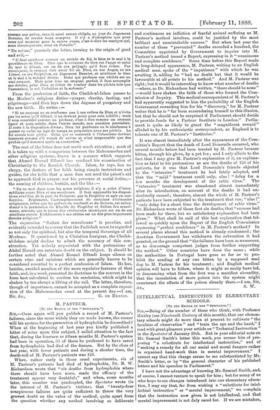M. PASTEUR.
[To THE EDITOR OF THE " SPECTATOR:I
Sfa,—Once again will you publish a record of M. Pasteur's failures, since the more widely they are made known, the sooner will his system for the prevention of hydrophobia be discredited ? When at the beginning of last year you kindly published a letter of mine upon this subject, I called attention to the fact that, during the fourteen or fifteen months M. Pasteur's system had been in operation, 53 of those he professed to have saved from hydrophobia had died of the disease. But by the close of ]ast year, with fewer patients and during a shorter time, the death-roll of M. Pasteur's patients was 126.
When, rather early in those cruel experiments, six of N. Pasteur's patients had died of hydrophobia, Dr. B. W. Richardson wrote that "six deaths from hydrophobia where there should have been none, made the efficacy of the treatment appear very doubtful;" and when, some months later, this number was quadrupled, the Spectator wrote (in the interest of M. Pasteur's victims), that "twenty-four conspicuous failures are quite sufficient to throw the very gravest doubt on the value of the method, quite apart from the question whether any method involving so deliberate and continuous an infliction of fearful animal suffering as M. Pasteur's method involves, could be justified by the most brilliant and unmistakable success." But when last year the number of these "prevented" deaths exceeded a hundred, the Committee appointed by Government to inquire into M. Pasteur's method issued a Report, expressing in it "unanimous- and complete confidence." Some time before this Report made its long-delayed appearance, M. Pasteur, writing to an English medical man, spoke of the " impatience " with which he was- awaiting it, adding he "had no doubt but that it would be favourable at all points to his method." And M. Pasteur was right ; but it would be interesting to know what number of deaths —where, as Dr. Richardson had written, "there should be none" —would have shaken the faith of those who formed the Com- mission of Inquiry. This medical correspondent of M. Pasteur's had apparently suggested to him the probability of the English Government rewarding him for his "discovery," for N. Pasteur writes that he is "far from surrendering himself to this illusion, but that he should not be surprised if Parliament should decide to provide funds for a Pasteur Institute in London." Parlia- ment is quite as likely to grant the "magnificent reward' alluded to by his enthusiastic correspondent, as England is to tolerate one of M. Pasteur's "Institutes."
It was almost immediately after the appearance of the Com- mittee's Report that the death of Lord Doneraile occurred, who several months before had been treated by M. Pasteur because bitten, through his glove, by a pet fox ; and I only allude to the fact that I may give M. Pasteur's explanation of it, an explana- tion as fatal to his pretensions as are the deaths of 126 of his patients, for it was that Lord Donerafle's friends objected to the "intensive" treatment he had lately adopted, and that the " mild " treatment could only, alas ! "delay for a few months the development of the rabic virus." The " intensive" treatment was abandoned almost immediately after its introduction, on account of the deaths it had un- doubtedly caused ; therefore, almost the whole of M. Pasteur's patients have been subjected to the treatment that can, "alas !" "only delay for a short time the development of rabic virus." Dr. Richardson wrote of those first six deaths, that "excuses had been made for them, but no satisfactory explanation had been given." What shall be said of this last explanation that fol- lowed so quickly upon the Report of the English Commission expressing "perfect confidence" in M. Pasteur's method ? In several places abroad this method is already condemned ; the Austrian Government has withdrawn the subvention it had granted, on the ground that "the failures have been so numerous, as to discourage competent judges from further supporting- the method." Other countries have done the same ; while the authorities in Portugal have gone so far as to pro- hibit the sending of any one bitten by a supposed mad dog to M. Pasteur for his treatment ; and English medical opinion will have to follow, where it might so easily have led, in denouncing what from the first was a manifest absurdity, that the inoculation of more poison into the system might counteract the effects of the poison already there.—I am, Sir,
S. W.


































 Previous page
Previous page